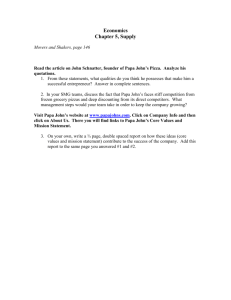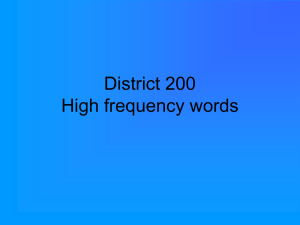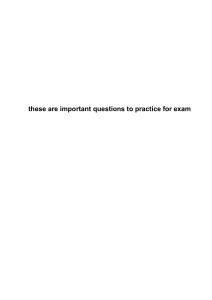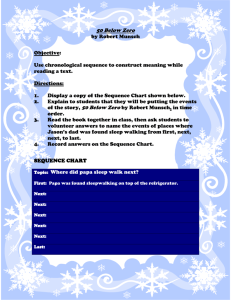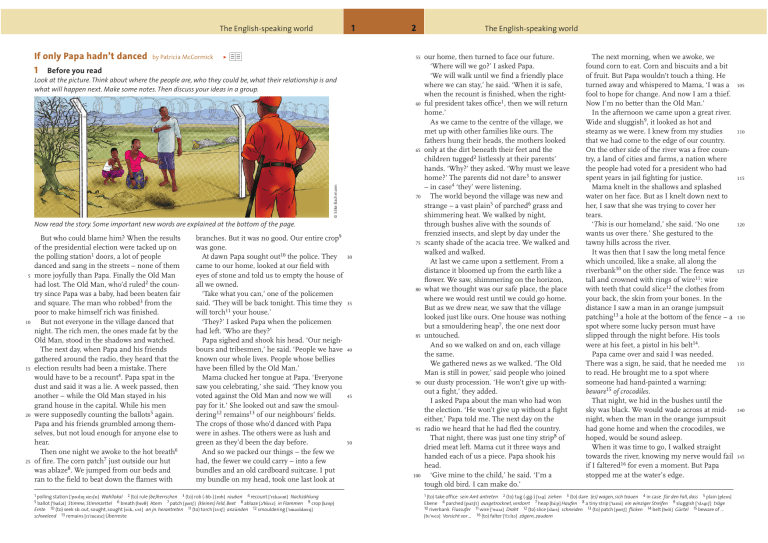
1 The English-speaking world If only Papa hadn’t danced 1 Before you read by Patricia McCormick 3 2 55 Look at the picture. Think about where the people are, who they could be, what their relationship is and what will happen next. Make some notes. Then discuss your ideas in a group. 60 © Silke Bachmann 65 70 Now read the story. Some important new words are explained at the bottom of the page. 5 10 15 20 25 But who could blame him? When the results of the presidential election were tacked up on the polling station1 doors, a lot of people danced and sang in the streets – none of them more joyfully than Papa. Finally the Old Man had lost. The Old Man, who’d ruled2 the coun­ try since Papa was a baby, had been beaten fair and square. The man who robbed3 from the poor to make himself rich was finished. But not everyone in the village danced that night. The rich men, the ones made fat by the Old Man, stood in the shadows and watched. The next day, when Papa and his friends gathered around the radio, they heard that the election results had been a mistake. There would have to be a recount4. Papa spat in the dust and said it was a lie. A week passed, then another – while the Old Man stayed in his grand house in the capital. While his men were supposedly counting the ballots5 again. Papa and his friends grumbled among them­ selves, but not loud enough for anyone else to hear. Then one night we awoke to the hot breath6 of fire. The corn patch7 just outside our hut was ablaze8. We jumped from our beds and ran to the field to beat down the flames with branches. But it was no good. Our entire crop9 was gone. At dawn Papa sought out10 the police. They came to our home, looked at our field with eyes of stone and told us to empty the house of all we owned. ‘Take what you can,’ one of the policemen said. ‘They will be back tonight. This time they will torch11 your house.’ ‘They?’ I asked Papa when the policemen had left. ‘Who are they?’ Papa sighed and shook his head. ‘Our neigh­ bours and tribesmen,’ he said. ‘People we have known our whole lives. People whose bellies have been filled by the Old Man.’ Mama clucked her tongue at Papa. ‘Everyone saw you celebrating,’ she said. ‘They know you voted against the Old Man and now we will pay for it.’ She looked out and saw the smoul­ dering12 remains13 of our neighbours’ fields. The crops of those who’d danced with Papa were in ashes. The others were as lush and green as they’d been the day before. And so we packed our things – the few we had, the fewer we could carry – into a few bundles and an old cardboard suitcase. I put my bundle on my head, took one last look at 1 polling station [1p48l9N ste9Sn] Wahllokal 2 (to) rule (be)herrschen 3 (to) rob (-bb-) [rqb] rauben 4 recount [1ri.ka8nt] Nachzählung 5 ballot [1bäl4t] Stimme, Stimmzettel 6 breath [breT] Atem 7 patch [pätS] (kleines) Feld, Beet 8 ablaze [41ble9z] in Flammen 9 crop [krqp] Ernte 10 (to) seek sb. out, sought, sought [si.k, s0.t] an jn. herantreten 11 (to) torch [t0.tS] anzünden 12 smouldering [1sm48ld4r9N] schwelend 13 remains [r91me9nz] Überreste 75 30 80 35 85 40 90 45 95 50 100 The English-speaking world our home, then turned to face our future. ‘Where will we go?’ I asked Papa. ‘We will walk until we find a friendly place where we can stay,’ he said. ‘When it is safe, when the recount is finished, when the right­ ful president takes office1, then we will return home.’ As we came to the centre of the village, we met up with other families like ours. The fathers hung their heads, the mothers looked only at the dirt beneath their feet and the children tugged2 listlessly at their parents’ hands. ‘Why?’ they asked. ‘Why must we leave home?’ The parents did not dare3 to answer – in case4 ‘they’ were listening. The world beyond the village was new and strange – a vast plain5 of parched6 grass and shimmering heat. We walked by night, through bushes alive with the sounds of frenzied insects, and slept by day under the scanty shade of the acacia tree. We walked and walked and walked. At last we came upon a settlement. From a distance it bloomed up from the earth like a flower. We saw, shimmering on the horizon, what we thought was our safe place, the place where we would rest until we could go home. But as we drew near, we saw that the village looked just like ours. One house was nothing but a smouldering heap7, the one next door untouched. And so we walked on and on, each village the same. We gathered news as we walked. ‘The Old Man is still in power,’ said people who joined our dusty procession. ‘He won’t give up with­ out a fight,’ they added. I asked Papa about the man who had won the election. ‘He won’t give up without a fight either,’ Papa told me. The next day on the radio we heard that he had fled the country. That night, there was just one tiny strip8 of dried meat left. Mama cut it three ways and handed each of us a piece. Papa shook his head. ‘Give mine to the child,’ he said. ‘I’m a tough old bird. I can make do.’ The next morning, when we awoke, we found corn to eat. Corn and biscuits and a bit of fruit. But Papa wouldn’t touch a thing. He turned away and whispered to Mama, ‘I was a fool to hope for change. And now I am a thief. Now I’m no better than the Old Man.’ In the afternoon we came upon a great river. Wide and sluggish9, it looked as hot and steamy as we were. I knew from my studies that we had come to the edge of our country. On the other side of the river was a free coun­ try, a land of cities and farms, a nation where the people had voted for a president who had spent years in jail fighting for justice. Mama knelt in the shallows and splashed water on her face. But as I knelt down next to her, I saw that she was trying to cover her tears. ‘This is our homeland,’ she said. ‘No one wants us over there.’ She gestured to the tawny hills across the river. It was then that I saw the long metal fence which uncoiled, like a snake, all along the riverbank10 on the other side. The fence was tall and crowned with rings of wire11: wire with teeth that could slice12 the clothes from your back, the skin from your bones. In the distance I saw a man in an orange jumpsuit patching13 a hole at the bottom of the fence – a spot where some lucky person must have slipped through the night before. His tools were at his feet, a pistol in his belt14. Papa came over and said I was needed. There was a sign, he said, that he needed me to read. He brought me to a spot where someone had hand-painted a warning: beware15 of crocodiles. That night, we hid in the bushes until the sky was black. We would wade across at mid­ night, when the man in the orange jumpsuit had gone home and when the crocodiles, we hoped, would be sound asleep. When it was time to go, I walked straight towards the river, knowing my nerve would fail if I faltered16 for even a moment. But Papa stopped me at the water’s edge. 1 (to) take office sein Amt antreten 2 (to) tug (-gg-) [tcg] ziehen 3 (to) dare (es) wagen, sich trauen 4 in case für den Fall, dass 5 plain [ple9n] Ebene 6 parched [p2.tSt] ausgetrocknet, verdorrt 7 heap [hi.p] Haufen 8 a tiny strip [1ta9ni] ein winziger Streifen 9 sluggish [1slcg9S] träge 10 riverbank Flussufer 11 wire [1wa94] Draht 12 (to) slice [sla9s] schneiden 13 (to) patch [pätS] flicken 14 belt [belt] Gürtel 15 beware of … [b91we4] Vorsicht vor … 16 (to) falter [1f0.lt4] zögern, zaudern 105 110 115 120 125 130 135 140 145 The English-speaking world 150 155 160 165 170 175 180 185 190 ‘Wait here,’ he said. And then he scooped Mama up into his arms and waded silently into the darkness. It seemed a lifetime until he returned. He didn’t say a word, just lifted me up onto his shoulders and strode into the water. Every stick I saw was a crocodile. Under every rock, every ripple17 in the water, was a pair of ferocious jaws18. When we reached the other side, I leapt from his shoulders and kissed the sand. Once more Papa stepped into the river – this time to fetch our suitcase. Surely our luck wouldn’t hold again … I watched his back disappear into the dark and thought how much I loved that broad back; how it shoul­ dered all our woes19, and now all our hopes. Finally Papa emerged20 from the darkness with all our worldly possessions balanced on his head. Then we got down on our hands and knees and crawled along the base of the fence, like scorpions looking for a place to dig21. But the sand was unyielding and the fence invin­ cible22. Everywhere our fingers scrabbled23 for a weakness, someone – the man in the orange jumpsuit, most likely – had mended it with links of chain held tight with wire. The sky overhead had begun to brighten and the horizon was edged with pink. Soon it would be light24 and we’d be trapped between the waking crocodiles and the man with the gun in his belt. We came to a spot in the fence where a thorn bush grew on the other side. Papa said we would have to dig here: no time to keep look­ ing. Perhaps the roots of the bush had loos­ ened the sand, he said. If not, at least we could hide behind the bush, if only for a while. And so all three of us dug – Mama in the middle and Papa and I on either side – our hands clawing furiously at the earth. I’d only made a few inches of progress when the sky turned red. It would be dawn in less than an hour. I redoubled my effort25, working the outer edge of the bush where the soil was a bit looser. Soon I’d dug a hole barely big enough for a man’s foot. I lifted my head to call out to Papa to come and see my work – and saw the man in the orange jumpsuit striding towards us. Mama wailed26 piteously, then plucked at her hem where she’d hidden the tiny bit of money we had. She knelt in the sand, her arms out­ stretched, our few coins in her upturned palms27. But the man shook his head. He placed his hand on the belt that held his gun. ‘Take me,’ Papa begged him. ‘Spare28 the woman and the girl.’ Again the man shook his head. Then he reached into his pocket and took out a giant cutting tool. With one mighty snap he severed29 the links where the fence had been patched. He yanked30 on the fence so hard it cried out in protest, and peeled it back as if it were made of cloth. ‘Hurry,’ he said. ‘Once the light comes, I will have to go back to patrolling.’ We didn’t fully comprehend31 what he was saying, but we didn’t wait. ‘You go first,’ Papa said to me. ‘I want you to be the first in our family to taste freedom.’ I scrambled through the fence, stood next to the man in the orange jumpsuit and looked back at our homeland as the sun began to turn its fields to gold. ‘You will miss it for a long time,’ the man said to me. ‘I still do.’ I stared up at him. ‘Yes,’ he said. ‘I outran32 the Old Man long ago.’ Mama crawled through and kissed the man’s boots. He simply helped her to her feet. ‘Quickly now,’ he said, once Papa had made it through. ‘Walk, as fast as you can, until you see a house with white flowers out front. Go round to the back and tell them Robert sent you. They will feed you and hide you until night. Then they will send you to the next safe house, which will send you to the next, and the next – until finally you are in the city and can be swallowed up33 by all the people there.’ 17 ripple [1r9pl] Kräuseln, kleine Welle 18 ferocious jaws [f4!r48S4s 1d70.z] furchteinflößende Kiefer 19 woes (pl) [w48z] Sorgen 20 (to) emerge [i1m3.d7] auftauchen aus 21 (to) dig, dug, dug [d9g, dcg] graben 22 invincible [9n1v9ns4bl] unbesiegbar 23 (to) scrabble hier: wühlen 24 light hell 25 effort [1ef4t] Bemühungen 26 (to) wail [we9l] jammern, heulen 27 palm [p2.m] Handfläche 28 (to) spare [spe4] verschonen 29 (to) sever [1sev4] durchtrennen 30 (to) yank [jäNk] reißen, ziehen 31 (to) comprehend [!kqmpr91hend] verstehen 32 (to) outrun sb. jm. davonlaufen/entkommen 33 (to) swallow up [1swql48 cp] verschlingen 3 4 245 195 250 200 210 215 The English-speaking world ‘How do we know we can trust these people?’ Mama asked. ‘They are our countrymen,’ he said. ‘You will find many of us here. Now go!’ We did as he instructed, and found the house with the white flowers just as the morn­ ing sun broke through the clouds. A woman there brought us inside, gave us water and meat and led us to mats where we could rest. It had been so long since I’d slept on anything other than bare, open ground that I fell asleep at once. I awoke sometime later and saw that Papa’s mat was empty. I stood and wandered outside. The sun was setting, so all I could see was his silhouette against the deepening sky. He raised his arms to the heavens and started to hum34. And then I saw Papa dance. 34 (to) hum (-mm-) [hcm] summen © 2009 by Patricia McCormick, published in: Free? Stories Celebrating Human Rights, Amnesty International, Walker Books, London, 2009 Working with the text 1 Your impressions Think back to your discussion on the picture on page 1. How close were your ideas to what happened in the story? 2 The plot 220 Use the key words in the boxes to write the plot of “If only Papa hadn’t danced”. The narrator’s father dances when he hears that the Old Man has lost the election. … election • father • dance Old Man • rule • long time election results • mistake • recount one night • family’s fields • burn walk across country • night • sleep • day family • pack up things • leave home same thing • happen • many people police come • house will burn • next night river • edge of coun­ try • other side • free metal fence • crocodiles • river cross • night • father • wife/daughter dig hole • fence • before light narrator • see father • dance again man from same country • safe house man • stop them? • but • cut fence man in jumpsuit • repair fence • pistol 225 230 235 3 The atmosphere a) Without checking the text, finish this sentence: The atmosphere in the story is … 240 b) Find examples of how the author creates atmosphere. Collect them in a table like this: How Example Source metaphor adjective the hot breath of fire. smouldering … lines 24-25 … c) Compare and explain your charts. – ‘Hot breath’ makes you feel the fire is alive. – ‘Smouldering remains’ gives you the feeling the family has lost everything. –… Would you change your sentence from a)? Why? 3 SF Reading literature (pp.141–143) 255 260 5 The English-speaking world 4 The characters a) Make a network like the one on the right. Add notes to show the links between the characters. b) Choose a character from your network. Find parts of the text that tell you what kind of person he/she is. Collect information in a table like the one below. Name Papa Characterization Source Papa spat in the dust and lines 16-17 said it was a lie. … c) What conclusions can you draw from your table? Say how you see the character you chose. 6 The English-speaking world 1 daughter of Narrator Papa March bit.ly/edMZeO Al Jazeera (Qatar) 25 Mugabe is ____________ years old and hopes to 2008 ____________ ____________ as president for the sixth time. He says he will not rig the ____________ but will win them through majority voting. Mugabe says his friends in the east will help the country, such as Mama Man in jumpsuit esc ____________, ____________, Indonesia and Iran. He says the West never gives investment to ____________ ____________ but just little charitable ap ed fro amounts. ____________ people are arrested when the government knows m Old Man the facts. Mugabe is ____________ about winning this election. 2 March Tsvangirai says everyone is ____________ and ____________ . He thinks that he will ____________ the election. But perhaps Mugabe will say that STUDY SKILLS he is the ____________ . Tsvangirai says he will not become a new dictator Characterization in fiction The author of a story can describe or portray a character directly or explicitly by giving informa­ tion through the narrator or other characters. Characterization is indirect or implicit when we learn about the character by what they say or do or through the setting they are put in. 3 SF Reading literature (pp. 141–143) 5 Write either lines 140–158 through the eyes of Papa or lines 187–210 through the eyes of the man in the jumpsuit. step would be to limit the time that the president can stay in office to two ____________-____________ periods. If Mugabe admits that he has lost, Tsvangirai feels ____________ about the future of the country. 6 Researching Zimbabwe on the internet K The inspiration for Patricia McCormick’s story comes from Zimbabwe, where the election for presi­ dent took place on Saturday, 29 March 2008. The main candidates for the presidency were Robert Mugabe (of the ruling ZANU-PF party) and Morgan Tsvangirai* (the leader of the opposition party, * [1tSäNg9ra9] MDC). (to) rig manipulieren corrupt korrupt (to) arrest verhaften dicey [1da9si] heikel (to) defy [d91fa9] trotzen polls Umfragen accountable [41ka8nt4bl] rechenschaftspflichtig (to) let bygones be bygones die Vergangenheit ruhen lassen vindictive rachsüchtig because the people must make the leader ____________ . One important Tsvangirai will not punish him for ____________ against his people. Different points of view a) Before you watch the interviews with Mugabe and Tsvangirai from Sources 1 and 2 on page 6, make sure you understand the following words: 29 2008 Tip To watch the films, type the shortened URLs (bit.ly/…) into your browser. b) Use the information you find on the internet to complete the texts below and on pages 7–8. Tip Sources 3 to 12 are taken from websites around the English-speaking world. You don't need to read the whole article: just scan it for the information you need. 3 SF Skimming and scanning (p.139) bit.ly/g1Mdm7Independent Online (South Africa) April It seems that Morgan Tsvangirai, ____________ years old, has won the 2008 3 presidential election in Zimbabwe. He is said to have over 50 _____ _______ of the votes, an absolute majority. This makes a second round of voting unnecessary. The figures reported are: Tsvangirai ____________ %, Mugabe ____________ %. 2 © 2011 Cornelsen Verlag, Berlin · Alle Rechte vorbehalten d) Use your table to write a characterization. bit.ly/fDi6cO GuardianFilms (UK) 7 The English-speaking world 4 bit.ly/dY4pxV April CBC (Canada) Although the results of the presidential election are not yet official, the ZANU-PF party calls for a ____________. Tsvangirai calls this The English-speaking world 9 thetim.es/dJI6fD June The Times (UK) The second ____________ takes place. Voters’ fingers are coloured ____________ to show that they have voted. Nyasha from Epworth says ‘____________’ and ‘ridiculous’. The MDC is worried that violence might that people recorded his personal details to check how he ____________. be used against members of the ____________. He says your house will be ____________ if you vote for Tsvangirai, or if 5 bit.ly/glAIUU Daily Mail (UK) The results are published: Tsvangirai has ____________ % of the votes, Mugabe ____________ %. This means that there will be a ____________ May your finger isn’t red (because then they will see that you _______________). 2008 10 2 ind.pn/dHGPds The Independent (UK) Mugabe wins the second election with ____________ per cent of the vote. round of voting for the president. He start a new ________-________ term as president. The USA and other Tsvangirai is out of the country, trying to get international support for his countries protest but they have no support from ____________, opposition MDC party (M ____________ for D ____________ ____________ and ____________. C ____________) and against the dictator Mugabe. The MDC says that 11 ____________ of its members have been ____________ since the election. 6 bit.ly/eoz4Kc The Standard (Zimbabwe) ____________ starts a camp for Zimbabwean refugees1 May escaping from the ____________ in their country and asking for political asylum2 and 3 2008 ____________ protection. 7 bbc.in/glJFwe bit.ly/eCXZrn The Observer (UK) Many refugees try to cross the Limpopo River between Zimbabwe and South Africa – despite ____________ and wire fences. In South Africa BBC News (UK) K ‘I intend to ____________ to Zimbabwe within the ____________ period July 6 2008 ____________ attacks. Refugees are treated as illegal immigrants: the May 3 2008 12 bit.ly/9AbNAA Christian Science Monitor (USA) Two years later, ____________ and asylum seekers from Zimbabwe are still getting very little ____________ from the South African government. Instead they are given ____________, drink, ____________ and sleeping MDC supporters have been killed since the first election and there are bags from volunteer organizations. The ____________ Musati Project was ____________ people without homes. founded by Zimbabweans living in South Africa, and helps refugees from Al Jazeera (Qatar) Tsvangirai decides not to take part in the second election because of the violence. He says ____________ supporters have been killed and ____________ people are without homes. If it is a one-____________ election, it will not be a real ____________ for Mugabe. June Zimbabwe and ____________ ____________. 2008 7 Refugees in South Africa 25 Watch the slideshow and write a description of one of the people in the photos. Use what you have learned during the webquest to explain the problems facing the refugees. 13 1 refugee [!refju1d7i.] Flüchtling 29 2008 there are new dangers: in May, ____________ people died because of of time’. He will take part in the second round although ____________ bit.ly/eFxBg0 June number sent home from South Africa is ____________ per month. Morgan Tsvangirai makes a speech in ____________, announcing, 8 28 2008 2 asylum [41sa9l4m] Asyl mefeedia.com/watch/31160455 Médecins sans Frontières April 12 2010 May 12 2010 © 2011 Cornelsen Verlag, Berlin · Alle Rechte vorbehalten © 2011 Cornelsen Verlag, Berlin · Alle Rechte vorbehalten 6 2008 8 The English-speaking world Teacher's Solutions to 6 A Zimbabwean webquest 1 a) 84 b) take office c) elections d) China e) India f) developing countries g) Corrupt h) confident 2 a) angry b) hungry c) win d) winner e) accountable f) five-year g) crimes h) optimistic 3 56 – per cent– 50.3 – 42.9 4 recount – absurd – party 5 47.9 – 43.2 – second – Movement – Democratic – Change – 20 – killed 6 Botswana – violence – international 7 South Africa – return – shortest – 25 – 40,000 8 80 – 200,000 – candidate – victory 9 election – red – voted – destroyed – didn’t vote 10 85.51 – five-year – China – Russia – South Africa 11 crocodiles – 62 – xenophobic – 17,000 12 refugees – help – food – clothes – Adonis – other countries 9
